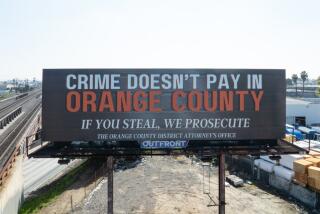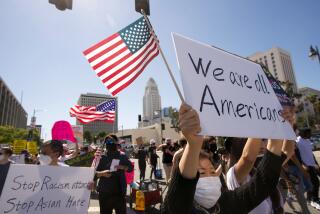Blacks share their painful stories of bias in Orange County
It was a reign of terror that reeked of rednecks and white hoods.
Tires were slashed, rocks hurled through windows and acid pellets fired at the car of a black family, who finally fled their neighborhood in November after months of attacks and racial taunts.
They were the sort of family you might like to have as neighbors: The husband and wife are law enforcement officers; they have two well-mannered sons.
And the Orange County city of Yorba Linda is the sort you might like to live in, where the median income is $115,000 a year and almost half the adults have college degrees.
That’s what made the episode so outrageous — but not, it turns out, an anomaly.
Rusty Kennedy tracks hate crimes as head of Orange County’s Human Relations Commission. Black people make up only 2% of the county’s residents, “but they are the most frequently targeted victims, year after year after year,” he said.
“There are stories like what we imagine would be [taking place] in the Deep South,” he said. “Many of our black families in Orange County are suffering.”
They may not all have their tires slashed, but they live with more subtle forms of discrimination that can, over time, hurt just as much.
The account of the Yorba Linda family hints at that hidden reality. That case hadn’t shown up on the hate crime list because police treated it as mere vandalism.
“There are two perspectives of what happens to African American families in Orange County,” said Kennedy. “What they perceive and what others think.”
The commission wanted to hear those perceptions first-hand, so planned a series of “listening sessions” in several communities.
The first was hosted last month by Orange County’s largest black congregation, Christ Our Redeemer AME, which meets in a rented hall in an Irvine industrial park. There was lots of talk from dignitaries — preachers, law enforcement officers, community leaders — about teaching tolerance, seeking justice, advocating for change.
Then the 200 or so black people formed small circles and shared stories of insult, indignation and pain.
Many involved problems with police: Betty’s grandson was arrested for skateboarding in an empty parking lot. Ulysses was spread-eagled across the hood of his car on his way home from work at juvenile hall. A fellow new to Brea was stopped near his home by an officer who said “I haven’t seen you around here before.”
Jona Knight-Hall said she was pulled over three times in 2007 in her new Mercedes. “It was always something like ‘Your passenger isn’t wearing her seat belt properly.’ ” She seldom got stopped in her old car. “But you can’t risk driving an expensive car. People look at you like ‘What is she doing with that?’ ”
“I felt completely helpless,” she said. She tried to file a complaint, alleging racial profiling. “But you can’t do anything about it, because people pretend that it’s all in your mind.”
::
Some of those who turned out seemed to have made peace with the downside of the good life in the suburbs of Orange County.
“Some things you just have to blow off,” said a well-dressed young man with a diamond stud in his ear. Orange County is, at least, “a good place to practice conflict resolution. “
But for others the pain seemed persistent and raw.
“Do I know my neighbors? I don’t want to know my neighbors,” one man said. “We know who they are. You see enough ‘isolated incidents’ and you know you’re among racists.” Just days before the listening session, his family heard young white men in a pickup truck yell, “White power!” at a multiracial group of teenagers outside a movie theater near their home.
I sensed the guilt felt by parents who moved to Orange County for good schools and safe streets but found their children ostracized and taunted. Some had trouble telling their stories, tearing up as they spoke, then apologizing as if they’d done something wrong.
“I moved here so he could have a good education,” said a sobbing Tyesha Emery. But her son’s classmates pelted him with racial slurs and dumped him in a trash can after football practice. “He used to be such a good student,” she said. “Now he doesn’t even want to go to school anymore.”
Another mother’s voice cracked as she admitted, with her teenage daughters looking on, “I feel like I have to spend every day countering the message that there is something wrong with us, wrong with being black.”
::
It was the first time many of those residents had shared their stories, Kennedy said. “They want to assume things are not racially motivated. I see people go through this internal process where you don’t want to face it. You don’t want to be defined by that ... so you don’t tell the story.”
But it seemed to me as I listened that it’s also hard to sort perception from fact.
What to make of the soft-spoken silver-haired woman insulted by a police officer “who was staring me down as I waited on the corner for the light to change.” Or the mother still brooding because a kindergarten teacher ran out of name tags just before getting to her daughter — the only black child in the class — 20 years ago?
What was clear is that the weight of accumulated slights can prime you to suspect the worst of every uncomfortable encounter. And over time, you either shoulder the blame or resent the strangers around you.
The commission plans to share the stories it collects with law enforcement, school and city officials. Kennedy believes that they can learn something.
“What happened in Yorba Linda was a horrendous crime, and we should go after the people who did it,” Kennedy said. “But there’s this idea that blacks shouldn’t make a big deal out of it; that it just tends to make people feel worse, like everybody is a racist.
“The desire to have this behind us ... that’s more prevalent in people who have never experienced discrimination,” he said.
More to Read
Start your day right
Sign up for Essential California for news, features and recommendations from the L.A. Times and beyond in your inbox six days a week.
You may occasionally receive promotional content from the Los Angeles Times.





